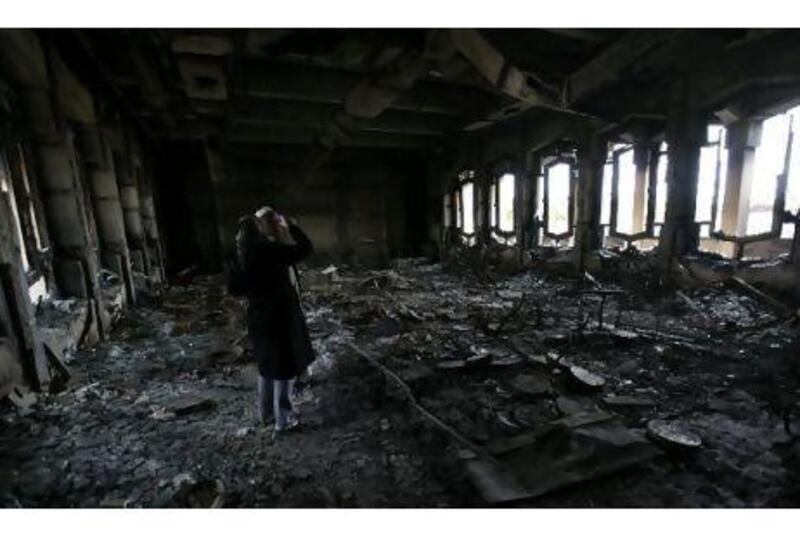NEW YORK // The world's permanent war crimes tribunal will start work today on what could be the highest-profile case in the court's history - a prosecution of Libya's defiant leader, Muammar Qaddafi, for orchestrating a brutal crackdown against protesters.
The prospect of seeing Col Qaddafi in the dock was made possible late on Saturday night when the UN Security Council voted unanimously to refer recent atrocities in Libya to the International Criminal Court (ICC), which is based in The Hague.
• More on the Libya unrest
After hours of closed-door negotiations and a surprise defection by Libya's ambassador to the UN, the 15 nation-body also agreed to slap an arms embargo on Libya and travel bans and asset freezes against Col Qaddafi and his cabal.
Discussions in New York took place against a backdrop of further bloodshed in the North African oil-producer, where more than 1,000 people are said to have been killed as Colonel Qaddafi struggles to quash a popular revolt against his 41-year rule.
Libya's self-styled revolutionary icon reinforced his capital, Tripoli, in a last-ditch bid to hold power in the face of a rebellion that has seen him lose control of the east of the country and the city of Benghazi.
Libyan security forces are accused of deploying African mercenaries and firing on protesters from helicopters, jets and even ambulances. The UN resolution says atrocities committed since February 15, when the uprising began, "may amount to crimes against humanity".
"Referring the case to the International Criminal Court shows that those who commit crimes against their own people will personally be held accountable," the German foreign minister, Guido Westerwelle, told Bloomberg News yesterday.
The resolution was circulated by Britain and France and adopted by all council members after the high-profile defection of Tripoli's UN ambassador, Mohammed Shalgham, who previously called Colonel Qaddafi a comrade and childhood friend.
In an emotional speech to the Manhattan-based chamber, Mr Shalgham rebelled against a 68-year-old dictator who was famously dubbed the "mad dog of the Middle East" and urged diplomats to "save" his violence-wracked nation.
The UN resolution bars the travel of Colonel Qaddafi and senior officials, including seven sons, a cousin, a brother-in-law and his daughter, Aisha Qaddafi, 32, who was dropped as a UN goodwill ambassador and reportedly tried to flee to Malta.
The UN secretary general, Ban Ki-moon, said council action would not immediately end "violence and the repression" in Libya, but lauded a "clear expression of the will of a united community of nations". He warned that "even bolder action may become necessary".
The most controversial aspect of the document was the referral of Libyan atrocities to the ICC, which has been rejected by the United States, Russia, China and other members of the Security Council as a threat to national sovereignty.
The Security Council referral of Sudan in 2005 was adopted after an 11-0 vote, with two permanent members, the US and China, among those abstaining. Analysts point to the importance of this weekend's 15-0 vote in support of sending Libyan atrocities to the ICC.
Richard Dicker, a lawyer for the pressure group Human Rights Watch, said: "Qaddafi's henchmen are now on notice that if they give, tolerate or obey orders to fire on peaceful protesters they may find themselves in The Hague. The Security Council's referral to the ICC is aimed at not only justice but also avoiding more victims."
The ICC prosecutor, Luis Moreno-Ocampo, will now decide whether to launch a full investigation and may apply to judges for warrants against Colonel Qaddafi and other regime officials, said a court official, Fadi El Abdallah. The prosecutor will report to the Security Council within two months.
An ICC referral does not mean Colonel Qaddafi will definitely end up in the dock. The court has no police force, relies on support from states that question its credibility and already has indictments pending against Mr Bashir and others who remain at large.
Tomorrow, the UN General Assembly will debate whether to revoke Libya's membership of the Human Rights Council, a 47-nation UN body in Geneva. Barring Libya will require a two-thirds majority of the 192-nation chamber.






